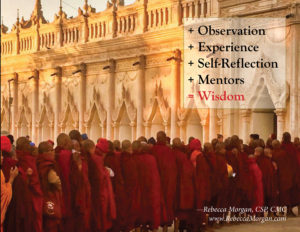I work closely with a tech company which isn’t a client. They have thousands of employees around the world. Their headquarters houses a few thousand.
Because I am a super-user of their site, I get asked to participate in special programs — some beta tests, some educating new, seasoned and prospective users. The few dozen staff with whom I’ve worked are smart.
However, because these intelligent people don’t have a lot of work experience, I find they make decisions that aren’t wise. They don’t think through the repercussions on their users before enacting changes. They don’t decide actions based on long-term ramifications, nor on the message their decision sends about the company’s values.
I find they lack …
wisdom.
They have some seasoned bosses, but not that many. And the ones with more experience seem to have so many people reporting to them no one gets the kind of guidance they should.
It made me ponder how someone gains wisdom. I narrowed it down to four things: experience, observing what works and what doesn’t, self-reflection, and mentors.
Let’s take each of these in turn.
Observation
Wise and successful people are keen observers. They learn not only from their own successes and failures, but from others. They notice what others do and the outcomes of those actions. They vow not to repeat the mistakes they watch others make. And they decide to adapt successful behaviors.
Perceptive observation includes curiosity. You want to ask, “I wonder what outcome he intended to have when he berated that employee.” “I’m curious to understand his motivation for not telling anyone the team goals had changed.” “I’d be fascinated to know what he was thinking when he said she was a pain in the back during the public acknowledgement of her.”
It’s easy to judge the offending behavior as bad and wrong when it is different than what you would do or like. Yet different people have different motivations as well as skills. By observing their behavior with curiosity you may uncover an understanding of someone’s motivations that don’t match your own.
Experience
Experience puts the lessons from observing into action. This means you take the theoretical and apply it to the real world. You have a grounding of what works and what doesn’t.
It’s easy to criticize others for actions you think are wrong, but it’s totally different doing it yourself. How many sports watchers criticize the incomplete pass thrown by the quarterback yet have never thrown one themselves? How many front-line employees complain about the executives decisions but have no idea what they debated to decide this path was the best for the organization? Experience means you’ve done the job, weighed different options, had some failures.
All experience does not lead to success. Some people muddle by just barely meeting the minimum requirements of the job. But experience is a critical component of wisdom.
Self-Reflection
Some say you learn best from your own mistakes. If you are smart and introspective, after each failure you ask yourself some important questions. Starting with, “What could I have done to create a different outcome?” You don’t blame the failure on everyone but yourself. Others may have contributed to it, but you did too. The more you are willing to look at your contribution, the better able you’ll be to head off failure in a similar situation in the future.
Companies now ask job applicants about their failures and their lessons from them. The thinking is that if you haven’t failed, you haven’t taken a risk. And if you haven’t learned something from those experiences, you aren’t emotionally mature enough to be a good team member.
That’s not to say you can’t also learn from successes. The key is to be astute and notice what you did to create the success so you can repeat it consciously. Some people think they are naturally successful without their having to plan to be that way. They are just not aware of what they’ve done to be successful so it will be harder for them to repeat the behaviors.
Mentors
An effective mentor is someone who takes interest in helping you succeed by offering guidance, input and candid feedback. If she thinks you are doing something stupid, she tells you in a way you can hear it. A mentor can be short term and offer input on a finite project, or long term, helping you mold your career and life.
A mentor can provide a higher-level, long-term view of your actions. He can help you see the messages you’re sending by your actions and decisions. He can assist you in seeing the broader ramifications of your behavior.
When I’ve been hired to be an executive coach, the relationship is that of a mentor. I can see beyond the issues at hand and help the person by asking them probing questions. Ideally a coach or mentor doesn’t tell you what to do, but asks you questions that helps you make wiser decisions.
How will you help make your people wiser? Can you enlist any of the above to increase your own wisdom?

